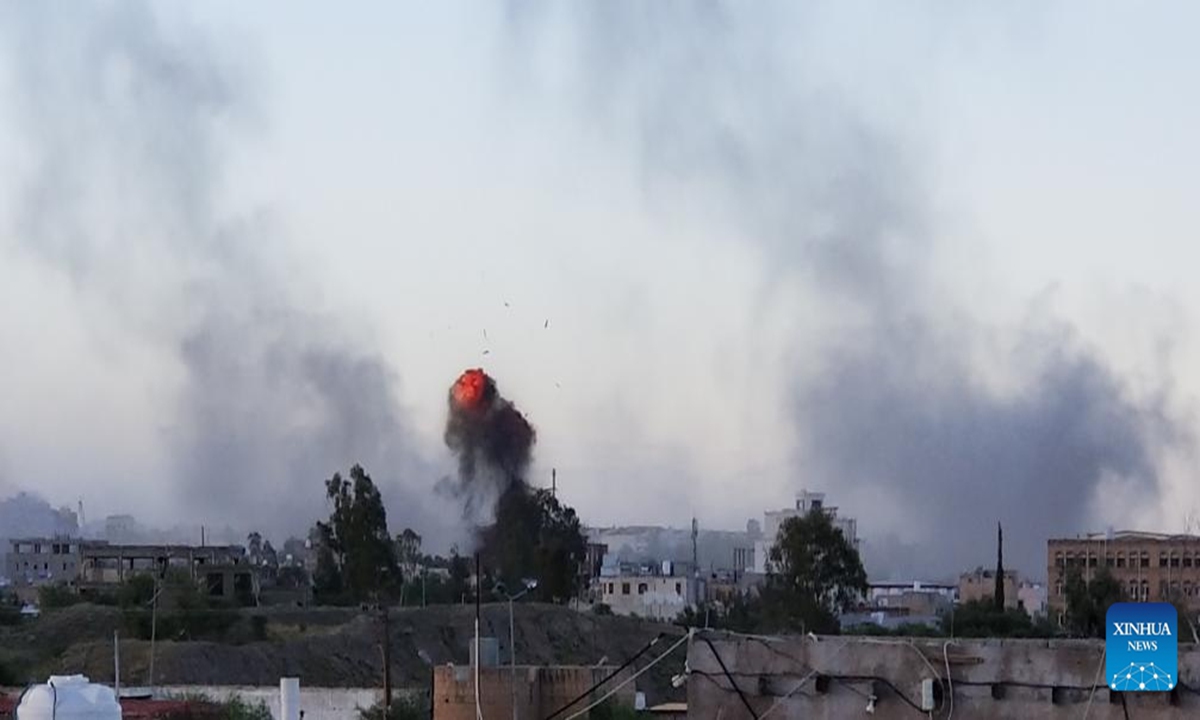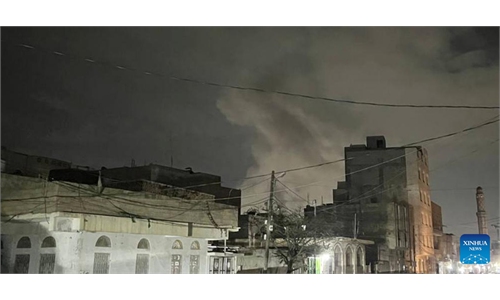
This photo taken by cell phone shows smoke rising following airstrikes in Sanaa, Yemen, Oct. 4, 2024. The United States Central Command (CENTCOM) said on Friday its forces conducted airstrikes on 15 targets in Houthi-controlled areas of Yemen. (Photo by Mohammed Azaki/Xinhua)
This month, Yemen's Houthi group announced the resumption of attacks against Israeli ships passing through the Red Sea, Arabian Sea, the Bab al-Mandeb Strait and the Gulf of Aden. In response, the US, Israel and other countries have intensified their military actions against the Houthis. The escalation of this "asymmetric conflict" has impacted the regional situation in the Red Sea and the southern Arabian Peninsula.The Houthi group has mostly operated from a position of "the weak against the strong." Consequently, it has relied on an "asymmetric strategy" to wage "asymmetric conflicts" as its primary means of achieving political and military objectives. Its confrontation with the US and Israel serves as a typical example of this strategy.
Although the Houthis' government is based in Yemen's capital, Sanaa, it is still regarded by most countries and international organizations as a non-state armed group and has not gained broad recognition from the international community. This asymmetry in status makes it much harder for the Houthis to gain international support while granting the US and Israel a psychological advantage. Additionally, whether in terms of troop numbers, advanced weaponry or military strike effectiveness, the Houthis are on a different level compared to their adversaries.
Faced with the disadvantages, the Houthis have leveraged asymmetric tactics and weaponry to create a unique "asymmetric advantage" in their military confrontations with the US and Israel. They use low-cost suicide drones and missiles to attack US aircraft carrier groups and Israeli territory, while the cost of American and Israeli countermeasures runs into hundreds of thousands or even millions of dollars per interception. The Houthis also take full advantage of the terrain in northern Yemen, employing guerrilla tactics to keep US naval forces stretched thin, which significantly reduces the effectiveness of aerial strikes.
This "asymmetric" conflict model maximizes the Houthis' strengths while making it difficult for their adversaries to fully exert their power. It is evident that the actions of both the Houthis and the US-Israel alliance have become key factors in reshaping regional and global dynamics.
First, the situation in Yemen will continue to deteriorate. Since the outbreak of the latest round of the Israel-Palestine conflict, Yemen's peace process has stalled. The ongoing conflict will inevitably have a negative impact on Yemen's internal political dialogue, efforts to alleviate the country's humanitarian crisis, and reconciliation between the Houthis and Gulf nations such as Saudi Arabia.
Second, the Israel-Palestine situation will become more complex. The confrontation between the Houthis and the US-Israel alliance represents a new round of struggle between the Middle East's so-called Axis of Resistance and the US-Israel alliance. As hostilities escalate, the US and Israel are likely to incorporate the Houthis into their future plans regarding the Palestinian issue. The actions of Middle Eastern resistance groups are likely to persist in the long term, creating more obstacles to the resolution of the Israel-Palestine issue.
Third, the US' Middle East policy under the new administration will face challenges. Details from the recently leaked US war group chat indicate that there are significant divisions within the US government over military actions against the Houthis. Many even believe that US strikes on the Houthis have allowed free-loading of Europe. If military conflict with the Houthis escalates, US decision makers will inevitably have to reassess their interests and may make major adjustments to their Middle East policy.
Finally, the Red Sea crisis will deepen, and it will continue to have a negative impact on global shipping. At a time of global economic downturn and heightened risks to international trade, any disruption to the global supply chain could trigger new crises. Such disruptions may affect the socio-economic stability of countries reliant on key shipping routes and could even further provoke Western powers to tighten control over international waterways.
The author is director of the Centre of Development and Governance in the Middle East at the Institute of West Asian and African Studies at the Chinese Academy of Social Sciences. opinion@globaltimes.com.cn

